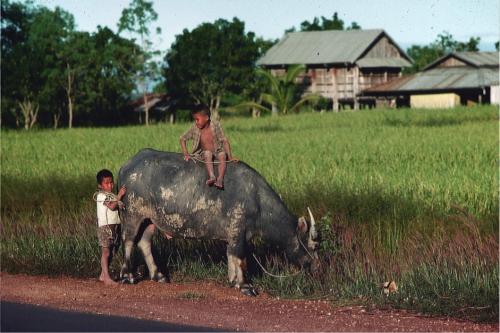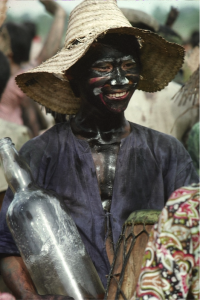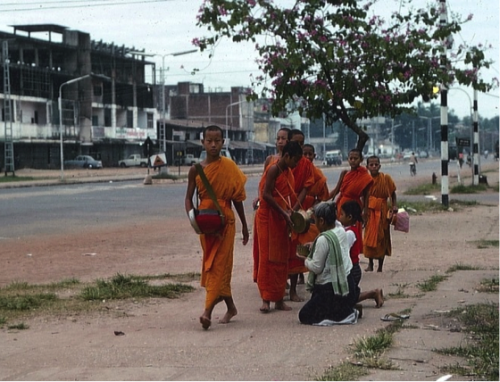4th November 2013 Vientiane, Laos
Laos through my eyes – James Kennedy
This article is part of a series of guest blogs contributed by Brits who have lived and worked in Laos, or who have other interesting links to Laos.
Compacting the hot sticky rice into a ball in my fingers and dipping it in chilli sauce, the smell and the adhesive feel of the rice bring the memories flooding back. I first came to Laos thirty-seven years ago, fresh out of university, as a VSO teacher at Dong Dok. It was my first time out of Europe, and I vividly recall the journey from the airport into Vientiane. It was evening, the air was hot and thick and full of cooking smells, with families spilling out of one-room homes to eat and spend the evening on the street, their lives lit by a single bulb or a pressure lamp.
In 2013 I find much has changed, but the smells are still the same; frying chilli, charcoal grilled meat and bananas, frangipani flowers and the pungent vegetable rubbish which seems to collect at street corners. Some sounds are also familiar – in what other capital city centre in the world can you be woken by a cock crowing in the morning? Back in 1976 my wake-up call came from the loud speaker on the street corner: “Wake up, citizens, it is good to get up! Work hard in cool of the early morning! Long live Marxist-Leninist thought!” Then followed patriotic songs extolling the virtues of the Lao people, and any further thought of sleep was impossible. Besides, the early morning is the best part of the day in Laos. I lived in Wattay Noy, in a house with a view over the Mekong River, and the motor-bike ride to Dong Dok through the cool of the rice fields was always a pleasure. There was no traffic then, apart from an occasional truck, and I saw more buffalos on the way to work than cars. The city stopped before the old USAID compound at kilometre 6, where the Kaysone Phomvihane memorial now stands, and the rest of the journey was through a countryside unchanged for centuries.

All the shops along Samsenthai and Setthatirat had been closed, and shopping was in one or two meagrely-supplied markets. There were still a few restaurants – Café La Pagode was a favourite – and a few shops selling mee soup, but few Lao could afford these. Then in 1977 a big new Soviet-style stalovaya opened, selling just one dish – feu soup. It was cheap and tasty, but the customer service standards had come straight from Russia: queue to pay, get a slip of paper, queue to have the paper stamped, and queue again to collect your food. It seemed so alien to the natural Lao hospitality and courtesy. Thankfully that seems to have disappeared now, and the food is more abundant and better than ever, served with a warm smile.
Looking back over the years two things stand out: first, the capacity of Lao people to party. Things were tough for many Lao in the 70s, and yet the boat races, pi mai, the rocket festival, all went ahead with a sense of purpose, commitment and sheer joi de vivre that seemed to be lacking in other aspects of life. And not just the major festivals: every village wat seemed to have its own annual boun, and foreigners were welcomed to join in. At pi mai of course joining in was compulsory. A group of us, VSOs and Lao teachers, went out for a picnic on motor-bikes. At every tiny bridge we were stopped by village kids, tipping buckets of filthy water over us, shouting and screaming with delight. At my normal lunch-time noodle stall, the usually staid and polite owner came up behind me, and slid an ice-cube down the back of my neck. And I have a memory, I don’t know where, having drunk quite a lot of lao lao, of ineptly dancing the lamvong with a remarkably pretty girl, when she dived off and came back a moment later to smear my face with greasy charcoal from a cooking pot, while her friend doused us both with a bucket of cold water.

Many Lao people were uncertain of what the future might bring. Some of my students disappeared during the year, crossing the river into Thailand in pursuit of a better future. My landlord announced he was going to start fishing on the river, and began rebuilding a fine long boat under our house. Then one night he was gone, with his family, but leaving one relative behind to collect our rent. The head of the English Department was arrested one day at Dong Dok, and taken off for re-education, on the grounds (we understood) that he had too close connections with Western foreigners. Indeed shortly after I left Laos the whole VSO English teaching programme was closed down, and politically correct East German teachers were brought in to replace us.
The second thing I will never forget is the friendliness of the Lao people. The exceptional warmth is still there, as I discovered going back to Dong Dok on my recent visit. It is very hard to describe this, but I know from talking to other expatriates who have spent time in Laos it is a common experience. Perhaps the best illustration I have is from the classroom. I found Lao students remarkably attentive and engaging, even if not necessarily diligent in doing their homework. (Of course in the 70s English homework was of a much lower priority than keeping up with political education classes and ‘voluntary’ community labour at the weekends.) It only happened three or four times during the year, but somehow the class would develop and elaborate a joke, at no-one’s expense, that grew and grew with different contributions, until the whole class at an imperceptible signal let out a great shout of ‘weee!’ I’ve never experienced anything like it anywhere else, and it is hard to describe the frisson, the sense of joy, love, and breaking of the comic tension that came with it.

Since leaving Laos I have lived and worked in a number of other countries, and have been serially promiscuous in my affection for each of them. But as the songs say, the first love is the deepest, and that love belongs to Laos.
James Kennedy was a VSO English Teacher at Dong Dok from 1976-77. He is currently Director of the International Office at the University of Warwick in the UK. He visited Laos again in October 2013 to launch the Chevening-Warwick scholarships for Lao students to study for Masters degrees in the UK.